CNSM Confederal Committee show solidarity to the actions of trade unionists form education branch
Members of the Confederal Committee of the National Trade Union Confederation of Moldova (CNSM) declares solidarity with the protests of the Trade Union Federation of Education and Science of the Republic of Moldova (FSEŞ) to be triggered on 17-20 January 2017. A statement in this regard was approved on Tuesday, January 10, in an extraordinary meeting.
We recall that the decision on holding protest actions was approved by the Board of FSEŞ on the 27th of December 2016, however, the final decision will be taken on Thursday, January 12 at the meeting of the General Council of the Federation, where was also invited the PM Pavel Filip.
The main claims of trade unionists in education relate to increase of function salary of teachers by 50% as from the 1st of January 2017, increasing the unique allowance granted to young specialists from branch to job placement, annual recalculation of the amount of pensions for retirees engaged in work and increase the amount of scholarships by 20% from the 1st of January.
DECLARATION of the Confederal Committee of the National Trade Union Confederation of Moldova on solidarity with the protests of the Trade Union Federation of Education and Science of the Republic of Moldova
Confederal Committee members of CNSM declare their solidarity and support actions of picketing, to be triggered on 17-20 of January 2017 at the decision of the Executive of the General Council of the Trade Union Federation of Education and Science of the Republic of Moldova.
It is outrageous that the legislature and the executive do not account for many complaints and appeals of trade unions to ensure decent living for working people through concrete measures to raise salaries, which for most employees and their families are the only sources of income.
We find that over recent years the authorities did not comply with their obligations defined by law to review the minimum wage at least once a year, taking into account the change of the consumer price index and the evolution of the average wage in the national economy, of the volume of gross domestic product, labour productivity and the value of the minimum of existence.
Or, the minimum wage has not been changed since 1/10/2014, being established at that time in the amount of 1,000 lei.
In the same time, from 2014 until present social and economic developments had a negative impact on living standards and purchasing power of the incomes of wage earners: the consumer price index increased by approximately 119.0%, increased the minimum subsistence 8.8%, the minimum wage only covering 55.0% of it.
In this regard, we reiterate that the increase of the minimum salary is an unconditional necessity, which would lead to increased work motivation to over 113.6 thousand employees in the public sector, payed under Unique Tariff Network. Most of these employees during 3 years have not benefited from wage increase and their function salaries range from 1,000 lei to 1,500 lei.
Referring to the situation in education we find that according to official statistics for September 2016, 12.7 thousand employees within the industry received a salary of 1,000 lei to 1,500 lei, and over 11 thousand – from 1,500 lei to 2,000 lei.
Although during 2016 there were taken some actions aimed at increasing wages in the public sector (setting wages supplements for length in service for support staff, indexation of salaries of teachers by 8.6% from September 1, 2016 etc. .), they remain to be much lower than the average wage. In October 2016 the salary in education was only 77.8 per cent of the average wage and the average wage of workers of culture, only 60.8 percent. In a similar situation are employees in other areas of activity financed from the state budget, such as civil servants, health professionals, social workers, soldiers, etc.
Comparing the minimum wage in the Republic of Moldova to the countries in the region, we find that it is the lowest – only about 46 euros. Meanwhile, in Romania gross minimum wage is about 277 euros and should be increased from February 2017 up to more than 315 euros, in Russia – about 117 euro, in Ukraine – 58 euros and will be doubled from the beginning 2017.
We note that the European Union’s recommendations addressed to all countries facing rising unemployment and poverty, it is to increase the minimum wage to the level of 60% of the average wage.
In this context, we urge strongly the Parliament and the Moldovan Government to increase the minimum wage to the subsistence level and a further establishing of it in report of 50 percent of the average wage and raise salaries of teachers by 50 per cent. Simultaneously, we called for a new law on the unitary pay for employees in the public sector.
On behalf of the Confederal Committee of CNSM,
President Oleg BUDZA



